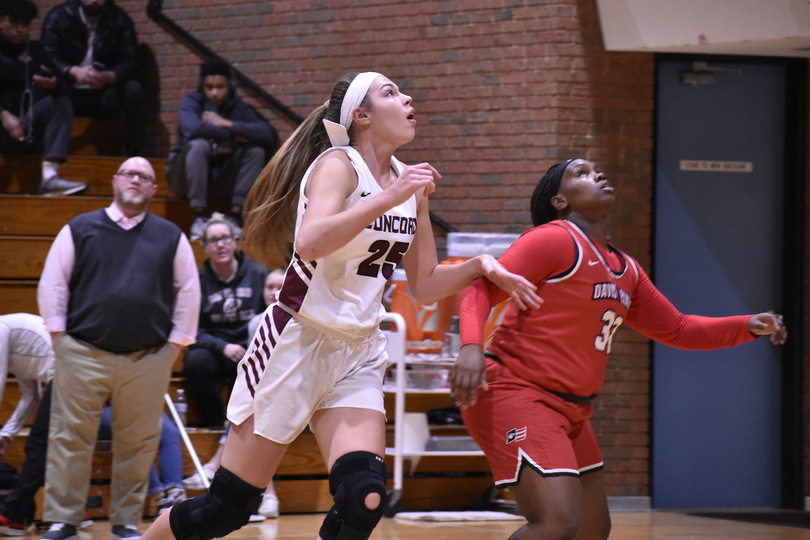Riley Fitzwater capitalized on her height after a state championship

Riley Fitzwater recorded Concord University’s first triple-double. Courtesy of Darby Fitzpatrick
Riley Fitzwater never saw herself as an elite high school player, let alone a college prospect.
As a high school freshman, she thought basketball was too fast-paced for her. Fitzwater knew she couldn’t shoot and didn’t think that would improve. Despite standing at 6 feet 4 inches, opponents pushed her around down low and didn’t allow position in the post. When Gilmer County (West Virginia) High School won the state championship in 2016, Fitzwater finally realized the potential her size and natural talent presented. Since then, she’s worked relentlessly to reach it.
“I got a few letters in the mail and a couple calls and people asked me to play AAU,” Fitzwater said. “I was like oh, maybe I can do this if I work at it a little harder.”
Fitzwater is the tallest player in the Mountain East Conference and her statistics show it. She led the conference in field goal percentage her freshman year and followed that up by leading the conference in blocks per game as a sophomore — teammates call her “Fitz-swatter.”
Fitzwater is working harder than she ever has before, her high school coach Amy Riddle said. She was always a good defensive player, but after winning the state championship she has worked to become a threat on offense — developing go-to post moves and learning to score through contact. As Concord University’s (18-8, 14-6 MEC) leading rebounder and second in points, teams have adjusted their defense to Fitzwater, but she in turn became stronger around the block. Fitzwater’s established several post-moves with her back to the basket and even improved on her jumpshot to become a threat on various levels of the court.
“We always try to go inside first,” said Concord head coach, Kenny Osborne. “Try to get the ball inside as much as we can, and she is going to score 70% of the time we get the ball on the block.”
Fitzwater was only 5 feet 8 inches in eighth grade, but is at 6 feet 4 inches as a college junior. She finds it funny that the university lists her — the team’s starting center — as a forward. Because of her height, Fitzwater dealt with fouls from opposing players, whether called or not. Riddle had the Titans intentionally foul Fitzwater in practice to simulate game situations and prepare for collisions.

Courtesy of Darby Fitzpatrick
Fitzwater found consistent spots in the post where she could receive the ball on the block and developed various go-to moves. When opponents figured out a way to deny her deep position, she started to practice in the high-post. She added a turnaround jumper to consistently hit from 15 feet.
Opponents could no longer match up with Fitzwater, so they sent double, even triple teams. She adjusted again — learning to become a playmaker for the Mountain Lions. Osborne still tells Fitzwater she is free to shoot against the double.
“Riley is sometimes too unselfish in the post,” Osborne said. “Sometimes she will kick it out when I wish she would make a move.”
If Fitzwater gets her teammates going early by passing out of double-teams, opponents have to decide who to defend. When Mountain Lions guards can hit their perimeter shots, Fitzwater then gets to take advantage in the post — she recorded Concord’s first-ever triple-double with 10 points, 20 rebounds and 11 blocks against West Virginia State in 2018. It was proof of what she thought she could be back in high school, and what Osborne saw come to fruition from her first game with the Mountain Lions.
“She had a double double off the bat,” Osborne said. “And the first game out I thought ‘we got a dandy right here.’”




